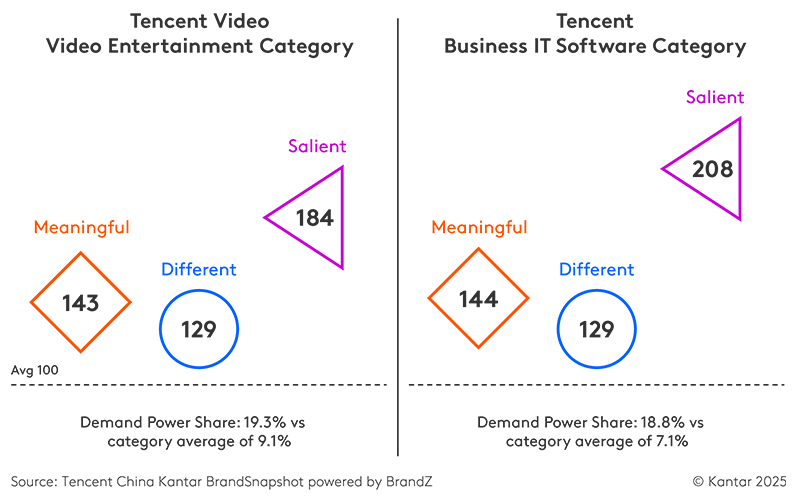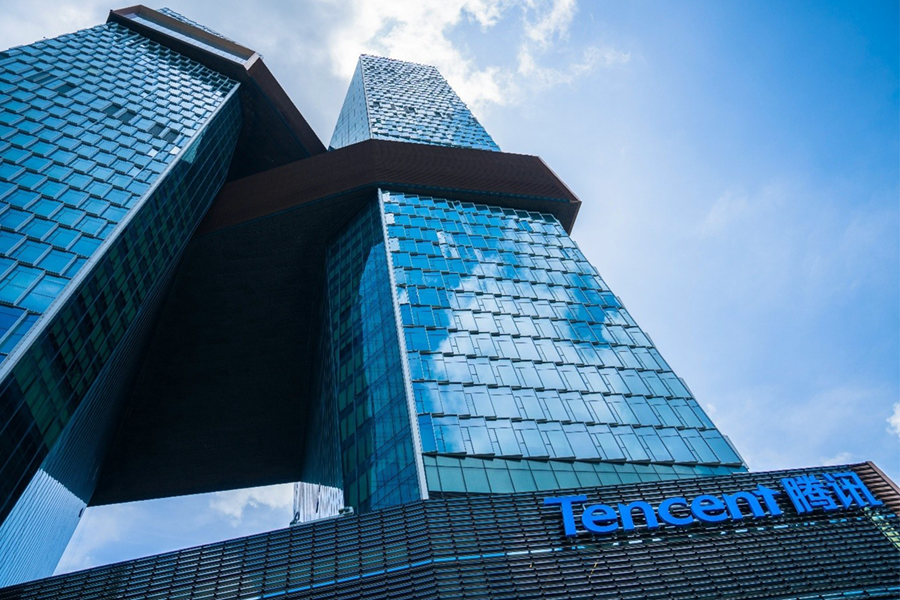Tencent, a Chinese multinational business, is known for building a deeply integrated brand ecosystem that delivers a single, connected experience. Its wide range of products and services includes the popular app WeChat, which integrates messaging, social networking, and mobile payments into one ecosystem. This year’s BrandZ Most Valuable Chinese Brands Report finds Tencent in the top spot for the fifth consecutive year. Its brand value in 2025 is up 53% on last year.
How has Tencent become so successful? The answer lies beyond its obvious technological prowess. At the heart of its commercial strength is a profound emotional connection with Chinese consumers. And that connection starts with Tencent’s signature app, WeChat.
How WeChat shapes everyday life
If you live in the West, it can be hard to appreciate the role that WeChat plays in the lives of the Chinese people. Most don't just use WeChat, they live within its ecosystem. From morning conversations with family to hailing a cab, and from transferring money to late-night payments at street vendors, WeChat has woven itself into the fabric of daily existence in ways that few brands have achieved elsewhere. Tencent isn't just providing a service; it's enabling relationships, memories, and life experiences.
Kantar Marketplace’s BrandSnapshot confirms the strong connection Chinese consumers have with WeChat. The brand is hugely Meaningful, Different, and Salient, with Demand Power more than three times the category average in online sharing and networking, up from twice the category average the previous year. Despite being a huge brand, it continues to grow at a healthy pace. The only brand that comes close in Demand Power is Douyin, the Chinese sibling of TikTok. However, Douyin does not offer the same breadth of services as WeChat and, as a result, has a smaller and less diverse user base.

Expanding brand strength across categories
Further driving Tencent’s success is its presence in online gaming, which started with the launch of QQ Games in 2004. Since then, games have become an important part of the WeChat ecosystem, and the company has significantly expanded its gaming business through investments in companies like Riot Games (League of Legends) and Epic Games (Fortnite). Beyond gaming, Tencent has broadened its reach into logistics and online retail, largely through investments, partnerships, and the WeChat ecosystem, and it is now looking to expand internationally.
The strength of the Tencent brand carries far beyond WeChat. BrandSnapshot finds that Tencent-owned Honor of Kings and League of Legends dominate the gaming category. In video entertainment, Tencent Video is the strongest brand, ahead of brands like iQIYI, Youku, and BiliBili. Tencent extends its brand equity with strong Meaning and Salience in cloud computing, a key contributor, and in business IT software and systems, though these play a smaller role in its overall business. Finally, while somewhat less well-differentiated, Tencent has achieved a strong position in two other consumer categories: information, news, and search, as well as online finance platforms.

Tencent’s success beyond technology
To find a brand that possesses such strong equity across multiple B2C and B2B categories is unusual, to say the least. So, what is the underlying driver of this success? Recently, much has been made of Tencent’s ecosystem-driven AI innovations like the Hunyuan model and Yuanbao chatbot, which have enhanced ad targeting and search across platforms like WeChat. However, these innovations reflect a more important, fundamental driver of Tencent’s long-term success.
User-centric philosophy and meaningful technology
The name Tencent is said to derive from co-founder Ma Huateng’s name (also known as Pony Ma) and the Chinese character Xun which means “information” and conveys the idea of “galloping fast information". Be that as it may, Pony Ma has instilled a strong philosophy in the way Tencent operates. He not only advocates for a culture of speed and agility but also champions a user-centric mission: “Value for Users, Tech for Good.”
This philosophy is reflected in Tencent’s commitment to practical innovation—technology that solves real problems rather than flashy features without substance. Its ability to deliver on this promise is evident across product categories in BrandSnapshot, where Tencent is consistently perceived as a brand that improves people’s lives.
Cultural relevance at home and abroad
Part of Tencent's brand strength stems significantly from its deep understanding of Chinese culture and consumer preferences. Unlike many foreign companies that have struggled to localise their services in China, Tencent’s products feel inherently Chinese. However, this strength at home may prove a liability abroad. TikTok has proved that Chinese-origin technology brands can succeed internationally, but given Tencent’s focus on gaming, its global success will depend on how well it adapts to other countries and cultures. By increasing transparency about its governance structure and data-handling practices, Tencent could build greater trust with global consumers and regulators, avoid potential restrictions, and open the door to new partnerships with Western firms. Its overseas revenue contribution has already doubled in the past five years, underscoring the growing importance of international markets.
Technology that adds real consumer value
When a company like Tencent embraces new technologies like AI, blockchain, and cloud computing, it’s easy to attribute its success to the technology itself rather than to the way that technology is designed to create value for the end consumer. Tencent’s success today is just as much a result of its commitment to developing useful, reliable, and culturally sensitive products and services as it is of its technological and commercial dexterity. It will be fascinating to see how well the company can leverage its inherent strengths to bring the same success to its international expansion.
What can global marketers learn from Tencent?
Tencent is a valuable brand today because it adds meaningful value to the lives of the people it serves. Adoption of the latest technology only delivers real advantages when it's applied to meet genuine human needs and desires. For global marketers, the key takeaway is clear: never lose sight of the importance of reliably serving consumers in ways that align with their cultural expectations.
Read more about Tencent’s success in Kantar BrandZ’s Most Valuable Chinese Brands report, available to download now.
Kantar BrandSnapshot is a free interactive tool powered by BrandZ’s wealth of data and validated Meaningful Different and Salient framework. Designed to give you a complete picture of brand equity in competitive context, BrandSnapshot delivers insights on over 15,000 brands in 40+ markets.
Build a brand that connects in every culture. Explore BrandSnapshot on Kantar Marketplace for free today.


